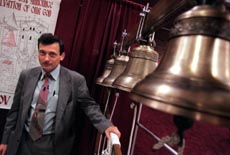Back to News page.
Pittsburg Post-GazetteWednesday, July 28, 1999 Russian bells hit high notes at church assembly By Ann Rodgers-Melnick, Post-Gazette Staff Writer
Amid the reverent bustle of vendors selling books and icons at the All-American Council of the Orthodox Church in America, the sweet, strong peal of church bells could be heard above all else.
That these pure bronze bells from a foundry in Russia are on sale at a convention in Pittsburgh is a sign not only of Orthodox revival in the former Soviet Union, but of the success of a small business enterprise formed not long after the collapse of communism. Last year, the Pyatkov & Co. bell foundry won the All-Russia Small Business Competition. Now, the five smallest of 10 Pyatkov models are on display at the first gathering in four years of Orthodox Americans of Russian descent. The bells not only sound beautiful, they are visually enchanting, with floral patterns engraved on the smaller bells, icons and inscriptions around the larger ones. Business has been brisk. "We think the United States is our great goal. At this event we see that our goal is not only a dream. After years of labor, we are close to it," said Mark Galperin, who came from Moscow four years ago to become general manager of Expanding Edge, Pyatkov's American distributor in San Francisco. The 1,000-year tradition of Russian bell-making was nearly a lost art in 1990 when Nikolai Pyatkov and some friends began to experiment with it after work each day. Elaborate, melodious bell ringing is an integral part of Russian Orthodox liturgy: The largest bell is struck in measured rhythm at the start of a service, a chain peal of many bells is struck repeatedly whenever water is blessed and a bell is struck 12 times at the end of the creed. But the militantly atheist Soviet authorities confiscated bells from churches across Russia soon after the revolution of 1917, eventually melting them down to make bullets. "And thus were many of the traditions of Russian bell-casting and bell-pealing lost during the darkness of this century," says the Pyatkov brochure. Pyatkov -- along with several other nascent foundries -- has worked diligently to recover those traditions. Russian bells are different from Western bells because they remain stationary while only the clapper moves. This gives them a softer sound, Galperin said. Galperin has been taking contingency orders from priests and lay leaders who must return home to get the approval of parish councils before the sales can be official. The posted prices, he said, are special OCA rates that will expire Saturday. The smallest bell, which weighs 18 pounds and sounds a C-sharp three octaves above middle C, costs $300. The largest, which weighs 3,036 pounds and sounds a C-sharp an octave below middle C, costs $51,750. A starter set of the four smallest bells would cost $2,550. According to the brochure, Pyatkov bells "give you the most bong for your buck!" The highlight of Galperin's week came yesterday when the pastor of St. Alexander Nevsky Cathedral in McCandless stopped by with one of his leading laymen. When the cathedral was founded on the North Side in 1892, the czar himself sent the parish a set of Russian bells. But the precious bells were melted in a terrible fire more than 50 years ago. The parish has made do ever since with a single A-flat fire hall bell. The Rev. Paul Suda was enamored of the beautiful Pyatkov bells. As he considered whether his parish would be willing to make such a purchase, his parishioner offered to purchase them as a gift. "I'm thrilled, absolutely thrilled," Suda said. Galperin, who promises delivery in three to four months, is thrilled, too. He knows that many American churches are built without bells or use electronic recorded bells. "I need to say that bell ringing is an American tradition,
too," he said. "The bell of freedom is still a bell. If America
has forgotten how to do it, they must rebuild the skills, the art
and enjoy it again." Back to news index page. |
